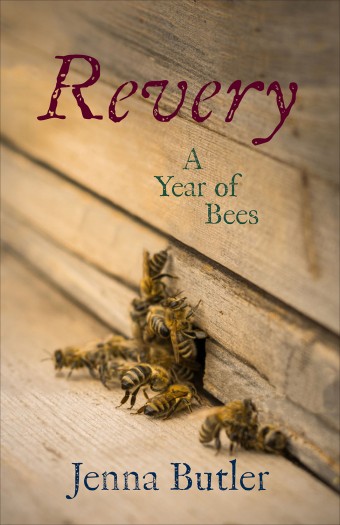One wouldn’t assume a story of bees would begin during the month of November on a small farm at the edge of the boreal forest in Alberta, but this one does. In preparation for winter, the hives are cleaned, stocked with honey, and bundled with blankets. Once the hives are sealed for the season, the bees are on their own.
“I hope you’re okay in there, lovelies. I hope you’re warm,” says Jenna Butler in Revery: A Year of Bees, a collection of essays. The book weaves together her personal journey of self-discovery and healing with the art of tending to both wild bees and domesticated honeybees.

- Revery
- Jenna Butler
- Wolsak and Wynn Publishers Ltd.
- $18.00 Paperback, 160 pages
- ISBN: 978-19-89496-13-8
“It seemed like a logical step for a diversified small farm: vegetables, healing herbs, flowers, and eventually bees and eggs,” says Butler. “That was certainly a part of what attracted me to beekeeping.”
But there was another reason behind it. “I’m an abuse survivor, and PTSD can dull you to the world in a way that puts a film between you and everything else,” Butler explains. “I wanted my world back, and I wanted myself back. And so I turned to beekeeping as a craft that could potentially teach me a lot about navigating both pain and fear in the body.”
Readers gain a deeper understanding of the delicate ecosystem bees require, and the necessary relationship that develops between Butler and her bees for their mutual survival.
Butler opens readers’ eyes to the devastation of colony collapse disorder, deliberates over the repercussions of introduced flowers compared to native flowers, questions mass farming practices, and delves into the canola and honey industries that thrive in Alberta.
One agricultural practice questioned is the treatment of the 60,000 migrant workers who come to Canada each year to assist in farming and beekeeping.
“Honestly, it’s ridiculous that it took a pandemic for us to be forced to consider our own systemic biases and the deplorable conditions facing many migrant workers in North American agriculture,” says Butler, “but being made to look at the many flaws in the system that make it unsustainable and unsafe is a good thing. I truly hope we’re forced to revamp our agriculture and apiculture industries in such a way that they become safer and more equitable for all.”

Revery is also a manifesto stating how, as individuals, people can do better by the bees and work to fight climate change.
“The small things each of us can do may feel like just that: small things. Insignificant, really, in the scope of climate change,” says Butler. “But if you make mindful small changes, and I do, and all of our family members do, and our community members as well, before long, those small changes stack up. Then we’re making waves.”
Butler hopes her readers understand how their actions affect the survival of bee populations.
“Mostly,” she says, “I hope that people will learn to look closer and think twice. Before we tidy up that weedy patch in the yard, who’s relying on the nectar and pollen from those dandelions? Before we cut down that old willow behind the house, who’s foraging in those catkins in the spring? And before we spray goodness-knows-what herbicide, which pollinators could we be impacting? (Hint: all of them.)”













